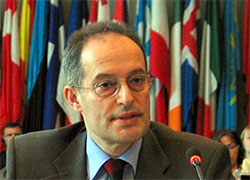Belarusian authorities don't want UN Rapporteur to visit Belarus
5- 2.02.2015, 12:10
- 7,327

The Belarusian authorities refuse to cooperate with Miklos Haraszti and do not recognise his mandate.
The issue of extending the mandate of the UN Rapporteur on the situation of human rights in Belarus will be considered in May.
Belarusian human rights defenders meet today with UN Special Rapporteur on the situation of human rights in Belarus Miklos Haraszti.
Radio Svaboda learnt it from Valiantsin Stefanovich, the deputy head of Viasna human rights centre.
Haraszti will held consultations with the Belarusian human rights defenders as part of preparation of the report on the human rights situation.
“It will be consultations with Belarusian human rights groups regarding the general situation in the country in different sectors, mainly in what concerns political and civil rights. The UN Human Rights Council will decide in May whether to prolong the mandate of the Special Rapporteur. It's difficult to say what will happen, taking into account the events in Ukraine. For us, it is a rather important tool to assess the situation, because the mandate was given by the UN Human Rights Council,” the human rights defender said.
Stefanovich says the Belarusian authorities refuse to work with Haraszti and do not recognise his mandate.
“The Special Rapporteur hasn't visited Belarus to assess the situation on site and meet with representatives of the authorities. We have to meet with him outside Belarus,” he says.
The two-day meeting takes place in the Human Rights House in Vilnius.
The main topics that will be raised by the Belarusian human rights defenders during the consultations can be found in Viasna's report “Human rights situation in 2014: Trends and evaluation” that was published on the website of the human rights centre. The report noted that the “situation of human rights during 2014 remained consistently poor with a tendency to deterioration at the end of the year”.
“Human rights violations were of both systemic and systematic nature: basic civil and political rights were extremely restricted, there were no systemic changes in the field of human rights (at the legislative level and (or) at the level of practices),” the report stresses.
The only positive development in 2014 was the early release of Ales Bialiatski under the law on amnesty, according to human rights defenders.









